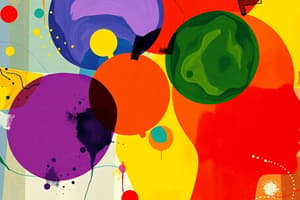Podcast
Questions and Answers
Study Notes
C180 Practice Quizzes - Foundations
- Structuralism's primary goal: To determine how particular sensations occur simultaneously.
- Psychology's definition: The scientific study of the mind and behavior.
- First school of psychological thought: Structuralism.
- Functionalism's primary goal: To focus on the adaptiveness of behavior.
- Gestalt psychology's principle: "The whole is greater than the sum of its parts."
- Psychoanalysis's founder: Sigmund Freud.
- Top need in Maslow's Hierarchy of Needs: Self-actualization needs.
- School of psychology focusing on information processing like a computer: Cognitive psychology.
- Profession earning an MD degree: Psychiatrist.
- Research method for watching behavior in natural settings: Naturalistic observation.
- Positive correlation example: The more I study, the higher my exam score.
- Dependent variable in drug-anxiety study: Anxiety levels.
- Last step of the Scientific Method: Share the results.
- Definition of a hypothesis: A prediction.
C180 Practice Quizzes - Biological Perspectives
- Part of neuron housing the nucleus: Cell body.
- Neurotransmitter associated with motivation, reward, and movement: Dopamine.
- Systems comprising the autonomic nervous system: Sympathetic and parasympathetic nervous systems.
- Lobe processing visual information: Occipital lobe.
- Lobe processing somatosensory information: Parietal lobe.
- Part of the brain routing sensory signals: Thalamus.
- Part of the brain converting short-term to long-term memories: Hippocampus.
- Brain lobe injured in Phineas Gage's accident: Frontal lobe.
- Brain part for physical coordination and attention: Cerebellum.
- Master gland in the endocrine system: Pituitary gland.
- Sexual hormones for men: Androgens.
- Hormone released during stress: Cortisol.
- Neuron type causing a reflex response: Sensory neurons.
- Type of processing exemplified by prior knowledge influencing perception: Top-down processing.
- Brain part receiving smell sensory information: Olfactory bulb.
- Smallest amount of stimulation to detect a stimulus: Absolute threshold.
- Focused attention phenomenon in noisy surroundings: Cocktail party phenomenon.
- Gap between neurons: Synapse.
C180 Practice Quizzes - Theories of Memory
- Unconditioned stimulus in Pavlov's study: Food.
- Conditioned stimulus in Little Albert study: White rat.
- Stimulus generalization definition: Reacting similarly to stimuli similar to the conditioned stimulus.
- Operant conditioning method for increasing behavior: Reinforce the behavior.
- Example of negative punishment: Taking away car keys for breaking curfew.
- Example of negative reinforcement: Choosing early morning shopping to avoid crowds.
- Example of a primary reinforcer: Orange juice.
- Reinforcement type used initially in shaping behaviors: Continuous reinforcement.
- Example of stimulus generalization: A child fearing all flying insects after being stung by a bee.
- Conditioned stimulus in a cat's response to cupboard opening: The sound of the cupboard door opening.
- Memories of events associated with time and place: Episodic memories.
- Unconscious memories not voluntarily accessed: Implicit memories.
- Process where prior experience affects how we perform a subsequent task: Priming.
- Capacity of short-term memory: 7 +/- 2 items.
- Part of working memory for planning, reasoning, and problem-solving: Central executive.
- Tendency to remember beginning and end items in a list: Serial-position effect.
- Test type for assessing recognition memory: Multiple choice.
C180 Practice Quizzes - Personality Development and Social Psychology
- Part of personality operating on the pleasure principle: Id.
- Part of personality representing a sense of right and wrong: Superego.
- Stage of Freud's theory involving toilet training: Anal stage.
- Creator of client-centered therapy: Carl Rogers.
- Criticism of Freud's theory: Not highly testable.
- Trait associated with anxiety, hostility, and depression: Neuroticism.
- Traits comprising Hans Eysenck's theory: Extraversion, neuroticism, and psychoticism.
- Temperament dimension in Buss and Plomin's theory: Emotionality.
- Common gender difference in socialization, according to social role theory: Girls taught to be nurturing, boys taught to be assertive.
- Bandura's Bobo doll study findings on learned behavior: Children imitated the aggressive behavior of the adult model.
- People with an internal locus of control: See control over events as coming from within themselves.
- Belief in one's ability to perform behaviors: Self-efficacy.
- Components of attitudes: Affective, behavioral, and cognitive.
- Feeling when behaviors contradict attitudes: Cognitive dissonance.
- Negative attitude towards a group: Prejudice.
- Negative behavior towards a group: Discrimination.
- Theory explaining prejudice based on competition for resources: Realistic conflict theory.
- Tendency to favor one's own group: Ingroup bias.
- Fear of negative stereotypes: Stereotype threat.
- Attribution type explaining behavior based on internal factors: Internal attributions.
- Example of fundamental attribution error: Judging someone's behavior solely based on their personality, not considering situational factors.
- Theory focusing on trading benefits and costs in relationships: Social exchange theory.
- Components of Sternberg's triangular theory of love: Intimacy, passion, and commitment.
- Factor influencing obedience in Milgram's experiment: A perceived authority figure telling participants to do so.
- Tendency not to help strangers in group situations: Bystander effect.
- Helping motive without expecting recognition: Altruism.
- Conditions defining a psychological disorder: Distress, impairment, and risk of harm.
- Minimum duration of symptoms for Major Depressive Disorder: Two weeks.
- Diagnosis for abnormally elevated mood & behaviors: Manic episode.
- Negative symptom of schizophrenia: Minimal movement.
- Example of a compulsion: Lock checking.
- Eating disorder characterized by low weight and body image distortion: Anorexia nervosa.
- Personality disorder characterized by unstable relationships & self-harm: Borderline personality disorder.
- Analysis level not a part of psychological diagnosis: Stress.
- Factor predisposing to a disorder in diathesis-stress model: Genes.
- Therapy focused on understanding psychological causes via insight: Insight-oriented therapy.
- Therapy focused on rewarding positive behaviors: Cognitive-behavioral therapy.
- Exposure therapy technique: Imaginal and in vivo exposures.
- Monitoring therapy progress by self-reporting: Self-monitoring.
- Therapy approach encompassing different techniques: Eclectic approach.
- Class of medications targeting serotonin levels in depression: SSRIs.
- Method for activating brain regions via magnetic impulses: Transcranial magnetic stimulation (TMS).
- Type of therapy prioritizing unconditional positive regard: Humanistic therapy.
Studying That Suits You
Use AI to generate personalized quizzes and flashcards to suit your learning preferences.
Related Documents
Description
Test your understanding of foundational concepts in psychology with this quiz. Covering various schools of thought, research methods, and psychological principles, this quiz is essential for students of psychology. Perfect for those preparing for exams in C180 or introductory psychology courses.




